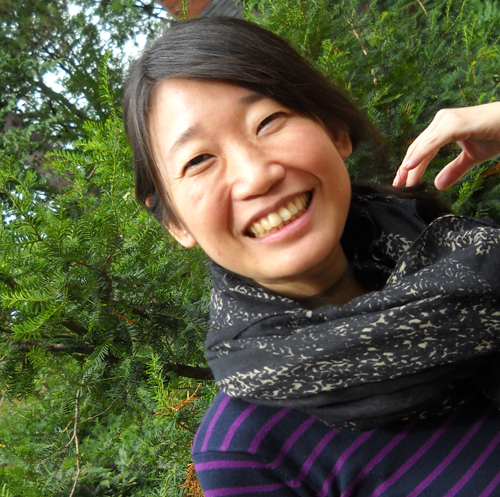
What difference can an astute reader make to an emerging writer? Ask novelist and short story writer Madeleine Thien.
As an undergrad at the University of British Columbia (UBC), she wrote a story that had received mixed workshop reviews. Looking for a new perspective, she took her work to novelist and poet Joy Kogawa, UBC’s writer-in-residence that term.
Kogawa’s response? Keep writing, she said. “’You don’t have to worry, you’re going to be a published writer, you’re going to be okay,’” says Thien. She smiles and adds, “That was the first time anyone said that to me.”
That early effort became the title story of Thien’s award-winning 2001 collection Simple Recipes. Among her subsequent works, the novel Dogs at the Perimeter published in 2011 was shortlisted this year for Germany’s International Literature Prize.
As writer-in-residence this semester at the University of Guelph, Thien will consult with emerging writers among students, faculty and staff. Her primary function, she says, will be to give her best reading of their work.
“All literature is about the reading as well as the writing,” says Thien. “The reader-and-writer conversation is what the process of literature is about.”
Writing is also about finding your place in the wider world. “The act of writing is part of an examined life.” She doesn’t mean “writing as therapy”: therapy is inward-looking and almost too small an idea.
Writing fiction takes you outside of yourself, she says. You can’t help widening your perspective to consider your surroundings, where you live, the society of which you’re only a small part. It’s a way of looking, she says.
For Thien, that means intense, sustained viewing of the sort that took her to Cambodia again and again while writing her most recently published novel. Dogs at the Perimeter is set during the genocidal regime of Pol Pot and the Khmer Rouge that resulted in millions of deaths in that country in the 1970s. While researching and writing, she spent four or five months a year for about five years living in Cambodia. “That kind of intensity I think you need.
“I’ve never been able to see a place for a few weeks and then write about it.” She worries about misinterpreting and maybe only cementing stereotypes by what she calls “writing at a very thin layer of awareness.”
She’s just finished writing a new novel that shifts the focus to China. The story unspools against larger events, including the study of western classical music at the Shanghai Conservatory, Mao’s Cultural Revolution of 1966-76 and the Tiananmen Square protests in Beijing in 1989.
Thien was only 15 years old when she watched the Tiananmen Square protests and massacre on the TV news at home in Vancouver. It was really her first glimpse of China.
Her parents spoke Chinese but used different dialects: her father had grown up in Malaysia, her mother in Hong Kong. After meeting at school in Australia and returning briefly to Malaysia, they arrived in Canada in 1974. So did Madeleine in a way: “I was conceived in Asia and born in Canada.”
Her new novel, called Awake Now and Cross Towards Them, tells the story of a boy named Sparrow who “loves Bach beyond reason.” The book traces the choices he’s forced to make while coming of age at the beginning of the Cultural Revolution.
Thien is fascinated – and maybe as confounded as anyone – by how characters develop in a story. “It’s a mystery, it’s a mystery,” she says. “Once a character exists, you don’t remember them not being there.”
It’s a bit like nurturing a friendship, she says. You have to be patient and you have to listen before characters will reveal themselves. Even then, there are things they might not tell you – the very sign to Thien that a character has begun to breathe on their own.
“It’s impossible to know everything about others. That’s what makes them feel alive. You’re building a world in all its facets.”
She’s beginning a writing project with Rawi Hage, her Toronto-based partner and the author of novels including Cockroach (2008) and Carnival (2010).
Thien began a bachelor of fine art in dance at Simon Fraser University and completed a master’s degree at UBC. She has lived in various places from Montreal to Berlin – and has taught in Hong Kong – but this is her initiation to Guelph. “Southwestern Ontario is super-exotic to me. It’s still mythical. I’m not sure this is less foreign and I love that about it.
“I feel as writer-in-residence, I want to be in the place and part of the community where I’m writing.”
Browsing downtown near her rented home this semester, she’s conscious of varying sensibilities – or maybe characters – rubbing up against each other. “There are multiple worlds in that downtown,” says Thien.
She has served as a mentor for U of G’s MFA program in creative writing. Catherine Bush, novelist and associate co-ordinator of the program, says Thien’s “deeply inquiring mind and curiosity are a gift to student writers, and I know she’s as curious about all the Guelph community has to offer.”
Thien will read and discuss writing with members of the campus community Mondays and Tuesdays from 10 a.m. to 4 p.m. Her office is in Massey Hall, Room 104B. To arrange an appointment, contact mboterma@uoguelph.ca.